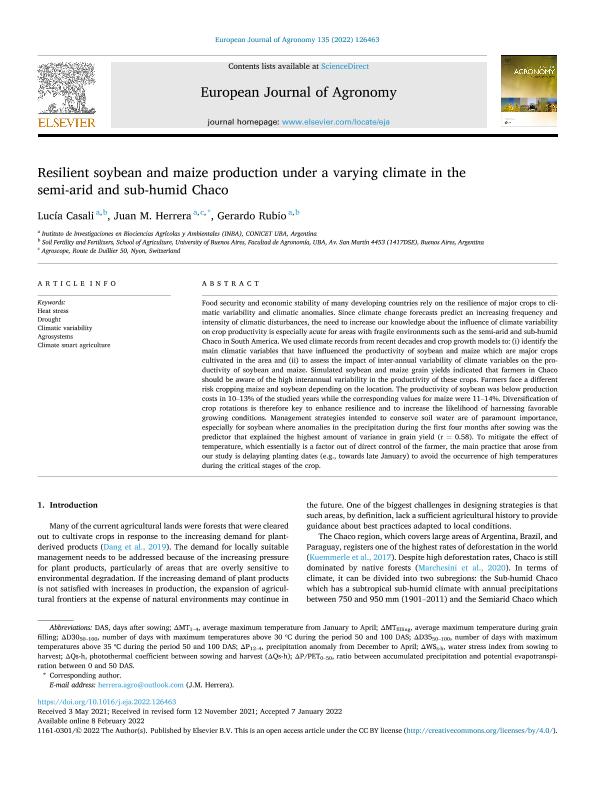Mostrar el registro sencillo del ítem
dc.contributor.author
Casali, Lucía

dc.contributor.author
Herrera, Juan Manuel

dc.contributor.author
Rubio, Gerardo

dc.date.available
2023-08-22T15:35:10Z
dc.date.issued
2022-04
dc.identifier.citation
Casali, Lucía; Herrera, Juan Manuel; Rubio, Gerardo; Resilient soybean and maize production under a varying climate in the semi-arid and sub-humid Chaco; Elsevier Science; European Journal of Agronomy; 135; 126463; 4-2022; 1-11
dc.identifier.issn
1161-0301
dc.identifier.uri
http://hdl.handle.net/11336/208892
dc.description.abstract
Food security and economic stability of many developing countries rely on the resilience of major crops to climatic variability and climatic anomalies. Since climate change forecasts predict an increasing frequency and intensity of climatic disturbances, the need to increase our knowledge about the influence of climate variability on crop productivity is especially acute for areas with fragile environments such as the semi-arid and sub-humid Chaco in South America. We used climate records from recent decades and crop growth models to: (i) identify the main climatic variables that have influenced the productivity of soybean and maize which are major crops cultivated in the area and (ii) to assess the impact of inter-annual variability of climate variables on the productivity of soybean and maize. Simulated soybean and maize grain yields indicated that farmers in Chaco should be aware of the high interannual variability in the productivity of these crops. Farmers face a different risk cropping maize and soybean depending on the location. The productivity of soybean was below production costs in 10–13% of the studied years while the corresponding values for maize were 11–14%. Diversification of crop rotations is therefore key to enhance resilience and to increase the likelihood of harnessing favorable growing conditions. Management strategies intended to conserve soil water are of paramount importance, especially for soybean where anomalies in the precipitation during the first four months after sowing was the predictor that explained the highest amount of variance in grain yield (r = 0.58). To mitigate the effect of temperature, which essentially is a factor out of direct control of the farmer, the main practice that arose from our study is delaying planting dates (e.g., towards late January) to avoid the occurrence of high temperatures during the critical stages of the crop.
dc.format
application/pdf
dc.language.iso
eng
dc.publisher
Elsevier Science

dc.rights
info:eu-repo/semantics/openAccess
dc.rights.uri
https://creativecommons.org/licenses/by/2.5/ar/
dc.subject
AGROSYSTEMS
dc.subject
CLIMATE SMART AGRICULTURE
dc.subject
CLIMATIC VARIABILITY
dc.subject
DROUGHT
dc.subject
HEAT STRESS
dc.subject.classification
Agricultura

dc.subject.classification
Agricultura, Silvicultura y Pesca

dc.subject.classification
CIENCIAS AGRÍCOLAS

dc.title
Resilient soybean and maize production under a varying climate in the semi-arid and sub-humid Chaco
dc.type
info:eu-repo/semantics/article
dc.type
info:ar-repo/semantics/artículo
dc.type
info:eu-repo/semantics/publishedVersion
dc.date.updated
2023-06-29T10:15:08Z
dc.journal.volume
135
dc.journal.number
126463
dc.journal.pagination
1-11
dc.journal.pais
Países Bajos

dc.journal.ciudad
Amsterdam
dc.description.fil
Fil: Casali, Lucía. Consejo Nacional de Investigaciones Científicas y Técnicas. Oficina de Coordinación Administrativa Parque Centenario. Instituto de Investigaciones en Biociencias Agrícolas y Ambientales. Universidad de Buenos Aires. Facultad de Agronomía. Instituto de Investigaciones en Biociencias Agrícolas y Ambientales; Argentina
dc.description.fil
Fil: Herrera, Juan Manuel. Consejo Nacional de Investigaciones Científicas y Técnicas. Oficina de Coordinación Administrativa Parque Centenario. Instituto de Investigaciones en Biociencias Agrícolas y Ambientales. Universidad de Buenos Aires. Facultad de Agronomía. Instituto de Investigaciones en Biociencias Agrícolas y Ambientales; Argentina. Agroscope. Institute For Sustainability Sciences.; Suiza
dc.description.fil
Fil: Rubio, Gerardo. Consejo Nacional de Investigaciones Científicas y Técnicas. Oficina de Coordinación Administrativa Parque Centenario. Instituto de Investigaciones en Biociencias Agrícolas y Ambientales. Universidad de Buenos Aires. Facultad de Agronomía. Instituto de Investigaciones en Biociencias Agrícolas y Ambientales; Argentina
dc.journal.title
European Journal of Agronomy

dc.relation.alternativeid
info:eu-repo/semantics/altIdentifier/doi/https://doi.org/10.1016/j.eja.2022.126463
dc.relation.alternativeid
info:eu-repo/semantics/altIdentifier/url/https://www.sciencedirect.com/science/article/pii/S1161030122000119
Archivos asociados
